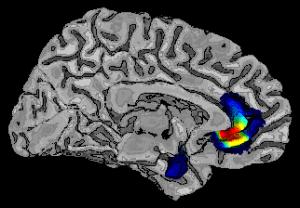TUCSON, Ariz. — Researchers at the University of Arizona announced Friday they had discovered a possible link between experiencing tragedy and feeling sadness. The findings, to be published in the October Journal of Health Psychology, offer new insights into treating those with depression and long-term chronic mental illness.
“This discovery is truly revolutionary,” noted Dr. Rachel Eisenstein, who headed the study. “This may be the breakthrough we’ve been looking for in treating the most difficult cases of depression we are facing in our society.”
Eisenstein’s team studied both individuals who had recently experienced direct personal tragedy or trauma as well as conducting related studies which simulated those experiences. In the latter, test subjects were brought in for tests that they were told would examine motor coordination and brain function, but the study was then interrupted by an important phone call for the subject in which they were told that a person close to them had just died.
“We used their emergency contact on the release form,” explained Arjun Karamchand, a PhD candidate in Arizona’s psychology program and one of the interns on the research. “When subjects took the phone call, they were still wired to the brain scanners. All the parts of the brain we associate with sadness just lit up like a Christmas tree as soon as they got the news.”
The Arizona team focused on the cingulate, the part of the brain most closely associated with feelings of sadness and depression. In over 95% of cases, the test subject’s cingulate was highly active during both hearing the purported news of the death of their loved one and immediately afterwards. In many cases, the cingulate remained engorged with blood and highly volatile for the remainder of the test subject’s time in the lab.
“We don’t want to jump to any conclusions just yet,” cautioned Eisenstein, who noted that far more research is needed to discover why this correlation may exist. “As yet, we have no proof for any sort of causal link between the tragedy and the feeling of sadness as indicated by increased activity in the cingulate. In fact, we suspect that the sadness may actually be causing the tragedy itself.”
If that is indeed the case, research may be needed into how to rebalance cingulate activity in order to prevent tragedies and save lives. “Every day, people are walking around with engorged cingulates and increased brain activity,” said Karmchand. “This is not only saddening these people, but may actually be endangering the lives of those around them.”
Further studies are planned to explore the nature of the tragedy or trauma experienced and its possible correlation to sadness. “We are hoping to fund one involving direct and immediate cessation of limbs,” Eisenstein added. “Understanding the link between direct trauma and sadness as opposed to mere emotional loss is key to understanding why people are experiencing these feelings of depression.”
Eisenstein admitted she has been having difficulty attaining funding for that study due to its controversial nature. “The cingulate is considered very fragile in the psychological community,” she said. “Some people say we shouldn’t do anything that could endanger its chemical balance, even in those who have consented to the research.”
Despite the controversy, Eisenstein insists her team’s research is critical. “Right now, there are all these people feeling unnecessary sadness in the wake of tragedy,” she said. “Frankly, the fact that a society like ours allows people to feel anything other than elation at all times is the real tragedy.”
She promised to continue her research, focusing on the possible development of drugs that will combat cingulate activity before, during, or after traumatic events. “There’s no reason tragedy has to make you feel less than your best,” she said.

For more on groundbreaking mental-health discoveries, please see the article Most Babies Chronically Depressed, New Study Warns.


